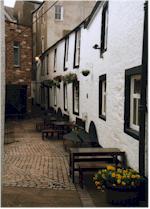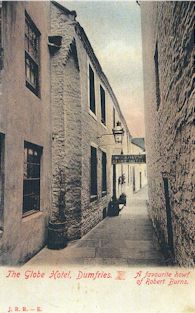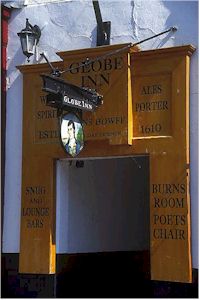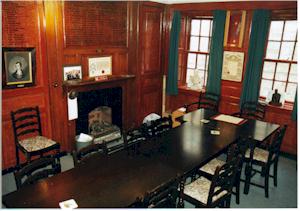|
|
| If someone were to choose the ideal situation for the commemoration of Robert Burns, for the recitation of his poetry and the singing of his songs, it would have to be in Dumfries, in the Globe Inn, or, as it was in his day, the Globe Hotel. This interesting old hostelry, popularly called ‘Burns Howff’, is situated in the High Street, along a narrow close opposite Assembly Street. It was near the Poet’s house and was ‘the tavern to which the Bard gave preference’ while he resided in the town. Many a jolly hour he spent there, as have, over the past hundred years, the members and friends of the Howff Club, in captivating surroundings and convivial company.
In Robert Burns’s day, the Hyslop family were proprietors of the Globe, and its associations with the Bard have brought world-wide fame to this little High Street hotel, so, when she fell heir to these associations from the Hyslops, Mrs Jane Smith considered it her bounden duty to preserve them. Since the time of Mrs Smith’s death in 1927, the Mill family and, at present, the McKerrow family, have religiously followed her lead and example. During the first forty years of its existence, Mrs Smith, ‘the genial hostess’, was held in the most affectionate terms among the members of the Howff Club, and became known as ‘the Mother of the Club’. She took a prominent part in the annual celebrations on the 25th, and it was her invariable custom to fill the Burns punch bowl and place it before the President, by whom the contents were dispensed with Burns’s toddy ladle. On the centenary of Robert Burns’s death, Mrs Smith was made an Honorary Member of the Howff Club along with her niece, Mrs Grierson. Mention must also be made of another genial hostess, Mrs Elizabeth Brown, or, as she was affectionately known, ‘Ma Broon’, who was employed with her husband John, to manage the Globe Inn, by the McKerrows. Both endeared themselves to Howff Club members during the war years and thereafter. Robert Burns brought many of his cronies to the Globe, including William Nicol, the High School teacher whom Burns met in Edinburgh, ‘kind-hearted Willie,’ of ‘Willie brewed a peck o’ maut.’ Along with Nicol, Robert Burns had met Allan Masterton, writing master in Edinburgh High School. In 1789 Nicol had travelled down from the capital to holiday in Moffat and, while there, was visited by Robert Burns and Masterton. Together they had ‘such a joyous evening’ that, on their return to Dumfries, Burns wrote the words and Masterton the music of the song. No doubt the scene of the Bacchanal was re-enacted at the Globe on many occasions during Nicol’s holiday. The first verse of the song mentions each of the three: ‘0, Willie brew ‘d a peck o ‘maut, At the Globe Hotel, Robert Burns made the acquaintance, among others, of Helen Ann Park, the barmaid and niece of the landlady, Mrs Hyslop. Burns immortalised young Helen when he wrote ‘Anna wi’ the Gowden Locks’. There is a story which relates that when he omitted, on one occasion, to order dinner at the Globe, Robert Burns was fined by having to give something new by way of grace. The Poet instantly, with appropriate gesture and tone, delivered this little gem: ‘0 Lord when hunger pinches sore, ‘0 Lord since we have feasted thus, The room off the Globe kitchen, known as Burns Room, remains today as it was in his lifetime, much of the furniture and fittings having been carefully preserved. In addition, Robert Burns literally left his mark on some of the Globe windows, and, on one of the upstairs rooms, one finds the following lines scratched by the Bard: ‘0 lovely Polly Stewart, and again, on another window: ‘Gin a body meet a body Polly Stewart’s father, incidentally, was factor on the Closeburn estates.
‘Following upon the Executive Meeting, a very pleasing and pleasant function took place in the new Room so kindly set aside in the Globe Inn by Mr McKerrow as a Club room, when the official opening and housewarming was carried through. Members of the Executive Committee along with Mr McKerrow, Mr James Denniston, Mr W. Black and a number of Club members were present. Mr E. K. Byers, President, occupied the chair and called upon Mr H.G. McKerrow to officially hand over the room. In his remarks, Mr McKerrow said that he had long felt that a room where the books and records of the Howff Club could be kept and where the members could meet, should be set aside for their convenience, and, on behalf of his father (Mr H. McKerrow) and himself, he had great pleasure in asking the President to accept the Room with their best wishes for the future prosperity and success of the Club. He also asked the President to accept a gift of books from the Dumfries Burns Club, and he hoped that the close Bond of Fellowship which at present existed between the clubs, would long continue, to the mutual benefit of both. The President said he had great pleasure in accepting the gift of the very fine Room on behalf of the Howff Club and its members, and thanked Mr McKerrow and his father for the great interest they had always shown in the welfare of the Club and its members. He also thanked the Dumfries Burns Club for their kind gift of books, and hoped that the members of the Howff Club would take full advantage of the new Club Room and its Library. Mr W. E. Boyd, one of the oldest members of the Club, said he would like to associate himself with the remarks of the President, and, on behalf of the members, expressed thanks to the McKerrow family for the great interest they had always taken in the Burns cult. Mr A.I. McElvogue, as a young member of the Club, also expressed thanks to Mr McKerrow, and said it was a very encouraging gesture, and would be a great help to the members and all lovers of Robert Burns. EXECUTIVE COMMITTEE OF 1939 M. H. McKerrow, John Burnie, Neil Little, Tom Waugh, Tom McCrorie, Tom Laidlaw, Tom McConnell, Dan Constantine, I. Maxwell Gray, John Marshall, John Brown, David Millar, L. Bell, H. G. McKerrow, This Room in the Globe remains to this day the official headquarters of the Dumfries Burns Howff Club. It is here worthy of note to mention the fascination that this ancient hostelry, with all its historic connections, holds for guests of the Club. The prospect of addressing the members unquestionably thrills them in a mysterious way, and the atmosphere within grips them, to their obvious delight. If one can quote, for example, the Rev. John Nivison of Orkney:
‘I have come a long way to be present with you in this old howff of Robert Burns, and I cannot voice my sense of the honour that is mine, as I stand before you now. In life, many events, experiments and conditions seem to be the natural product of plans and effort, and we take the expected as our due, but, on the other hand, the realisation of desire and the fruition of hope are, at times, so little short of marvellous, that we must pause and wonder. One of my ambitions has always been to stand where I am tonight. Ambitions are not the offspring of ability, nor are honours the proof of merit.’ ‘That to speak of Robert Burns in this town whose streets he walked, in the very howff where that deep, rich voice was heard in song and laughter, and sometimes in heart sorrow – this, indeed, might make the proudest humble.’ These are the thoughts of only two speakers who have delighted the Club with their presence over the century, but they are exemplary of so many who feel that the Globe can never lose its atmosphere and drawing power. People who have visited the hostelry are legion and the Visitors’ Book contains such names as Lord Rosebery, Robert Louis Stevenson, Rudyard Kipling, President Wilson, T. P. O’Connor, Andrew Carnegie, Lord Balfour and J. M. Barrie. Lord Rosebery said of the Hotel, in his centenary speech of 1896: “You have in this town the Globe, where we could have wished that some phonograph had then existed, which could have communicated to us some of Robert Burns’s wise and witty wayward talk.” These sentiments can only be re-echoed. For more information about The Globe Inn Dumfries visit their own web site. |



 Dumfries Burns Howff Club have the good fortune to hold their annual Anniversary Dinner and other main functions, together with their regular Committee meetings in this Inn/Hotel hallowed by Robert Burns. At the celebrations on the anniversary of the birthday of the Bard, they continue to carry through timehonoured ceremonies. What is now known as the Club Room or Mystery Room, and which is now used for all Club meetings and receptions, was gifted in 1949 by Mr M.H. McKerrow, a Howff Club Past-President and President of the Burns Federation from 1937 to 1943. During this time, he was proprietor of the Globe. The ‘Mystery’ tag arises from the fact that the room was only ‘discovered,’ in 1937, when Mr McKerrow employed an architect to look over the Hotel following purchase. The architect was puzzled by two extra windows on the north side, and, after investigation and the breaking down of a brick wall at the top of the stairs, found a room – the ‘Mystery Room’ – still with the original panelling and in an excellent state of repair. When and why was it bricked-up? No one will ever know! The following extract from the Minutes of 6th April, 1949 details in full the handing-over ceremony by Mr H.G. McKerrow:
Dumfries Burns Howff Club have the good fortune to hold their annual Anniversary Dinner and other main functions, together with their regular Committee meetings in this Inn/Hotel hallowed by Robert Burns. At the celebrations on the anniversary of the birthday of the Bard, they continue to carry through timehonoured ceremonies. What is now known as the Club Room or Mystery Room, and which is now used for all Club meetings and receptions, was gifted in 1949 by Mr M.H. McKerrow, a Howff Club Past-President and President of the Burns Federation from 1937 to 1943. During this time, he was proprietor of the Globe. The ‘Mystery’ tag arises from the fact that the room was only ‘discovered,’ in 1937, when Mr McKerrow employed an architect to look over the Hotel following purchase. The architect was puzzled by two extra windows on the north side, and, after investigation and the breaking down of a brick wall at the top of the stairs, found a room – the ‘Mystery Room’ – still with the original panelling and in an excellent state of repair. When and why was it bricked-up? No one will ever know! The following extract from the Minutes of 6th April, 1949 details in full the handing-over ceremony by Mr H.G. McKerrow: